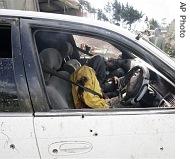Nairobi
09 November 2009
A Kenyan human rights body is calling for an investigation into the killing of the spokesman of a major Kenyan gang, saying the leader told the group a few weeks prior that his life was in danger from a government hit squad. Human rights groups have heavily criticized the nation's police for engaging in large-scale extra-judicial killings in its effort to crack down on the banned Mungiki sect.
 |
| Members of the Mungiki gang in a bullet-riddled car in outskirts of Nairobi, Kenya, 28 Apr 2008 |
"Gitau came to our office, and it is recorded here, that he came to the office to come and look for some of us on Friday the 16th of October 2009. He told me he wanted to give me certain 4-1-1 [information]. And I told him, 'What is that 4-1-1 about?' He said his life was under threat," Hassan said.
The parliament-created human rights body termed the killing an "assassination."
The Mungiki is an organized band of youths from Kenya's largest and most powerful tribe, the Kikuyu. The group, known for its criminal activities and extortion schemes, was founded with a call for its members to return to a form of mystic Kikuyu spirituality and to reject Western cultural influences.
Defenders of the group say the youth movement was founded as a means to express discontent with economic marginalization, but that the quick cash from the extortions transformed the poor youths into a criminal organization, which was then exploited by senior politicians.
Gitau was also head of the group's political wing, the Kenya National Youth Alliance, which the spokesman recently announced was being turned into an official cross-ethnic political party.
Omar claimed that the senior Mungiki member said that he was being trailed by a police squad known as the Kwekwe, mandated with neutralizing the gang. The police claim that the Kwekwe was disbanded earlier this year.
Gitau was shot in downtown Nairobi on Thursday by unidentified assailants. No one has been arrested for his death despite the fact that it happened in public view.
Omar said the commission would launch its own investigation.
"As a commission we again call for a credible investigation. But we will also proceed to see whether we can document the circumstances of his death. The best way right now for accountability is documentation. There might be a leadership that might not want to act on it, but I think the statute of limitation is such that there is no time limit for some of the most heinous crimes including murder," he said.
The human rights group had earlier accused the police of secretly killing up to 500 suspected Mungiki members during its 2007 crackdown on the group.
The murder of Gitau comes just weeks after the Mungiki's head leader, Maina Njenga, was released from custody after reportedly issuing a one-week ultimatum in which he threatened to name senior politicians who have supported the group.
In a bizarre public demonstration, the released leader then declared himself a born-again Christian and renounced violence, calling on Mungiki members to do the same. He then returned to live on his rural farm.
The freed leader has gone into hiding following the murder of Gitau.